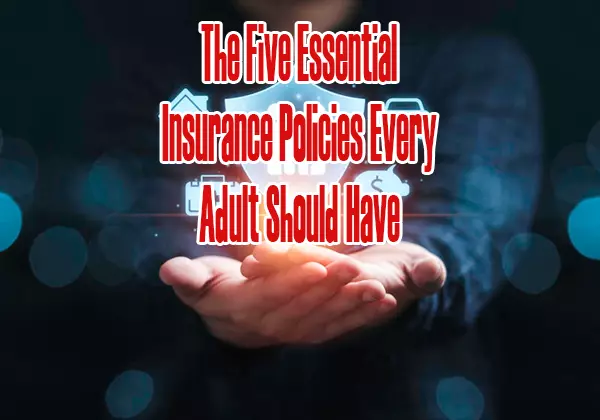Introduction
Insurance is an important aspect of our daily lives that often goes overlooked. We may not think about it until we need it, but having the right insurance policies in place can make a huge difference in our financial security and peace of mind.
According to a recent survey, nearly 30% of Americans have no life insurance, and 50% have no long-term disability coverage. This means that if the unexpected were to happen, many people would be left without the financial support they need to weather the storm.
That’s why it’s so important for every adult to have the following five insurance policies in place. These policies can protect you and your loved ones in a variety of situations, from medical emergencies to natural disasters to the loss of a breadwinner.
So, without further ado, let’s take a look at the five essential insurance policies that every adult should have.

Health insurance
Health insurance is perhaps the most important insurance policy you can have. Medical bills can be financially devastating, and even a minor injury or illness can lead to thousands of dollars in costs. Health insurance helps protect you against these costs, providing coverage for medical treatment, prescription drugs, and other health-related expenses.
There are several types of health insurance available to choose from:
- Employer-provided health insurance: Many employers offer health insurance as a benefit to their employees. If you have a job that offers health insurance, you should definitely take advantage of it.
- Individual/family health insurance plans: If you don’t have employer-provided health insurance, or if you are self-employed, you can purchase an individual or family health insurance plan. These plans are available through private insurance companies and can be purchased on the marketplace.
- Government-provided health insurance: There are several government-run health insurance programs available, including Medicare (for those over 65) and Medicaid (for those with low incomes).
When choosing a health insurance plan, there are several factors to consider:
- Coverage: Make sure the plan covers the medical treatments and services you need.
- Cost: Consider the premium (monthly payment), deductible (amount you must pay before insurance kicks in), and out-of-pocket maximum (maximum amount you will pay in a year).
- Provider network: Check to see if your preferred doctors and hospitals are in the plan’s network.
It’s important to do your research and shop around to find the right health insurance plan for your needs and budget. Don’t skimp on coverage just to save a few dollars – the peace of mind and financial protection that a good health insurance policy provides is worth it.
Homeowners/renters insurance
Homeowners insurance (also known as hazard insurance) is a must-have for anyone who owns a home. It covers damages to your home and personal belongings, as well as liability for accidents that occur on your property.
Renters insurance is similar, but it covers the personal belongings of renters rather than the physical dwelling. It’s important for renters to have this coverage as well, as the landlord’s insurance will not cover your personal belongings in the event of a disaster.
There are several types of coverage to consider when purchasing homeowners/renters insurance:
- Building and contents coverage: This covers damages to the physical structure of your home and your personal belongings within it. Make sure to inventory your belongings and determine their value to ensure you have enough coverage.
- Liability coverage: This covers legal costs if you are sued for an accident that occurs on your property. This can include things like slip and fall accidents or injuries sustained by guests.
- Additional living expenses coverage: If you have to temporarily relocate due to a covered loss (such as a fire), this coverage will pay for your additional living expenses, such as hotel bills.
When choosing a homeowners/renters insurance policy, consider the value of your home and belongings, as well as your liability risk. It’s also a good idea to shop around and compare quotes from multiple insurance companies to find the best coverage for your needs and budget. Don’t skimp on coverage just to save a few dollars – the peace of mind and financial protection that a good homeowners/renters insurance policy provides is worth it.
Auto insurance
Auto insurance is mandatory in most states, and for good reason. It covers damages to your vehicle and liability for accidents you cause. Without it, one accident could result in financial ruin.
There are several types of coverage to consider when purchasing auto insurance:
- Liability coverage: This covers damages and injuries that you cause to others in an accident. It includes two types of coverage: bodily injury liability and property damage liability. Make sure to have enough liability coverage to protect your assets in the event of an accident.
- Collision coverage: This covers damages to your own vehicle in an accident, regardless of who is at fault. If you have a newer or more expensive vehicle, collision coverage is a good idea.
- Comprehensive coverage: This covers damages to your vehicle from non-collision events, such as theft, fire, and natural disasters.
- Medical payments coverage: This covers medical expenses for you and your passengers in the event of an accident.
- Personal injury protection: This covers medical expenses, lost wages, and other expenses for you and your passengers in the event of an accident. It also covers you as a pedestrian if you are hit by a car.
When choosing an auto insurance policy, consider the value of your vehicle, your driving history, and the level of coverage you need. It’s also a good idea to shop around and compare quotes from multiple insurance companies to find the best coverage for your needs and budget. Don’t skimp on coverage just to save a few dollars – the peace of mind and financial protection that a good auto insurance policy provides is worth it.
Life insurance
Life insurance is a critical policy to have in place, especially if you have loved ones who rely on your income. It provides financial security for your family in the event of your death, helping to cover expenses such as funeral costs, outstanding debts, and ongoing living expenses.
There are several types of life insurance to choose from:
- Term life insurance: This type of insurance provides coverage for a specific period of time, such as 10 or 20 years. It is generally the most affordable option.
- Whole life insurance: This type of insurance provides coverage for your entire life and also includes a savings component. It is generally more expensive than term life insurance.
- Universal life insurance: This type of insurance is similar to whole life insurance, but it offers more flexibility in terms of premiums and coverage.
- Variable life insurance: This type of insurance is similar to whole life insurance, but it allows you to invest your premiums in the stock market. It is generally more risky than other types of life insurance.
When choosing a life insurance policy, consider your financial situation and the needs of your beneficiaries. Make sure to have enough coverage to adequately protect your loved ones in the event of your death. It’s also a good idea to shop around and compare quotes from multiple insurance companies to find the best coverage for your needs and budget.
Disability insurance
Disability insurance is a type of insurance that provides income if you are unable to work due to a disability. It’s important to have this coverage in place, as the likelihood of becoming disabled is higher than you might think. According to the Social Security Administration, 1 in 4 20-year-olds will become disabled before they retire.
There are two main types of disability insurance: short-term and long-term.
- Short-term disability insurance: This type of insurance provides income for a short period of time, usually a few months. It can cover things like medical leave for surgery or a serious illness.
- Long-term disability insurance: This type of insurance provides income for a longer period of time, usually until you reach retirement age. It can cover things like a serious injury or chronic illness.
When choosing a disability insurance policy, consider your job, your income, and the likelihood of becoming disabled. Make sure to have enough coverage to adequately protect yourself and your family in the event of a disability. It’s also a good idea to shop around and compare quotes from multiple insurance companies to find the best coverage for your needs and budget.
Conclusion
In conclusion, the five essential insurance policies that every adult should have are health insurance, homeowners/renters insurance, auto insurance, life insurance, and disability insurance. These policies can provide financial security and peace of mind in a variety of situations, from medical emergencies to natural disasters to the loss of a breadwinner.
Now that you understand the importance of these insurance policies, it’s time to review your own coverage. Do you have these protections in place? If not, it’s never too late to start. Take the time to shop around and compare quotes from multiple insurance companies to find the best coverage for your needs and budget.
Don’t wait until it’s too late to get the insurance coverage you need. Protect yourself and your loved ones by making sure you have these five essential insurance policies in place.
